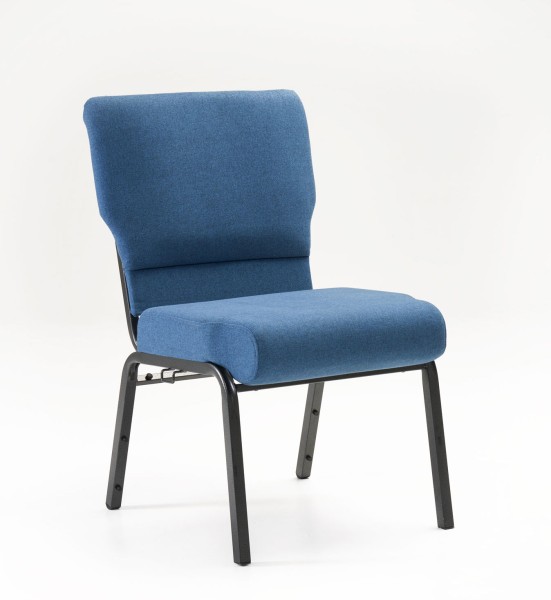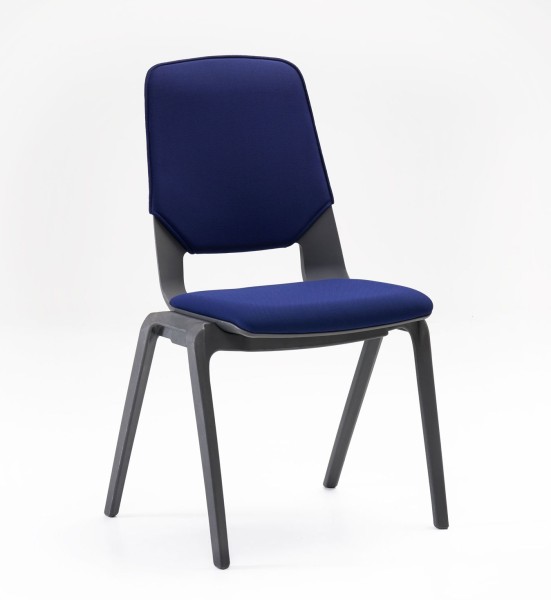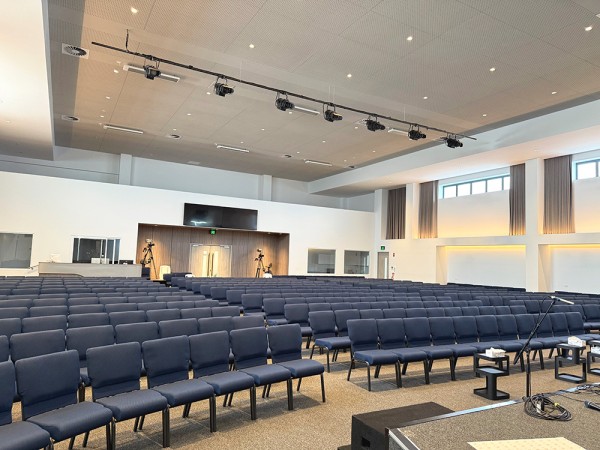Right, let's get straight to the point here.
If you're making decisions about church seating, you're probably getting conflicting advice about steel frames versus resin frames. Someone's telling you resin is "modern" and "lightweight." Someone else is pushing steel as "traditional" and "durable."
Here's the truth: Both materials work. But one choice will save you money over 25 years, and the other won't.
I've been in this business long enough to see churches make expensive mistakes because they focused on upfront costs instead of long-term performance. Don't be one of them.
The Real Problem with Quick Material Decisions
Here's what happens when churches choose seating materials based on initial price or marketing buzzwords:
Years 1-3: Everything looks fine. Both steel and resin chairs perform well under normal use.
Years 4-7: Differences start appearing. Load testing reveals capacity limitations. Weather impacts become visible.
Years 8-15: The gap widens dramatically. One material ages gracefully, the other requires replacement.
Years 16-25: The total cost of ownership becomes crystal clear. One choice paid for itself twice over, the other cost you thousands in replacements.
Want to know which is which? Keep reading.
Steel Frame Technology: Why 25-Year Warranties Are Possible
Let me show you exactly why steel frames consistently outperform resin over the long term.
Powder-Coated Steel Properties
Premium church chairs use powder-coated steel frames, not basic painted steel. Here's the difference:
Corrosion Resistance: Powder coating creates a chemical bond with the steel substrate that's 10x more durable than paint. This matters in New Zealand's humid coastal climate where salt air accelerates corrosion.
Load Distribution: Steel's molecular structure distributes weight evenly across the entire frame. A 180kg load capacity isn't just a number - it's engineered into the material itself.
Thermal Stability: Steel maintains its structural integrity across temperature ranges from -20°C to 60°C. Your church chairs perform identically whether it's a winter morning service or summer evening event.
The Alloyfold Church Chair uses powder-coated steel frames that undergo rigorous testing: 25,000 cycle load testing at full 180kg capacity, salt spray corrosion testing for 500+ hours, and temperature cycling from -20°C to 60°C.
Result: 25-year frame warranty backed by documented performance data.
Fibreglass-Reinforced Resin: Benefits and Honest Limitations
Now let's talk about resin frames objectively. They're not inferior - they're different. Here's when they work best:
The Resin Advantage
Weight Savings: At 6kg versus 9.5kg for steel, resin chairs are 37% lighter. This matters if you're reconfiguring seating weekly.
Design Flexibility: Resin allows for curved, organic shapes that steel can't achieve economically.
Corrosion Immunity: Resin won't rust, period. In extreme marine environments, this can outweigh other factors.
The Resin Reality Check
Load Capacity: 135kg versus 180kg for steel. That's a 25% difference that matters for larger congregations.
Thermal Expansion: Resin expands/contracts more than steel. You'll notice gaps in linked rows during temperature changes.
UV Degradation: Despite additives, resin breaks down under UV exposure faster than powder-coated steel.
Repair Complexity: Cracked resin requires replacement. Damaged steel can often be repaired.
The Trilogy Chair (fibreglass-reinforced resin) works excellently for frequent reconfiguration needs, contemporary design requirements, and moderate-use environments. But it comes with a 5-year commercial warranty for good reason.
Real-World Case Study: Melbourne Chin Church
Here's proof that material choice matters in practice.
Melbourne Chin Church in Melbourne, Victoria recently installed 840 Alloyfold Church Chairs with steel frames for their modern auditorium. This wasn't a small decision - with 840 chairs plus 800 book racks and 6 trolleys, they were making a significant investment.
- Load capacity: 180kg capacity handles their diverse congregation comfortably
- Durability: Frequent use by various community groups demands robust construction
- Warranty confidence: 25 years on frames, 15 years on foam justified the investment
- Operational efficiency: Steel's structural integrity maintains linking performance over time
The results: A seating solution that accommodates their large congregation whilst maintaining flexibility for community events. The chairs' stackable design and AirTech foam padding ensure comfort during extended worship services, while the robust steel construction handles frequent reconfiguration without degradation.
The financial reality: With 840 chairs, choosing resin would have saved approximately $8,400 upfront but likely cost $25,000+ in replacements over 25 years. Steel frames will serve this church for decades with minimal maintenance.
This is why smart church leaders think long-term.
The Load Capacity Reality: 180kg vs 135kg
This isn't just about numbers - it's about real-world performance and safety.
Why 180kg Matters
Safety Margins: A 180kg chair safely supports a 120kg person with 60kg safety margin. A 135kg chair has only 15kg margin.
Longevity: Higher load capacity means the chair operates well below its stress limits during normal use, extending lifespan.
Versatility: Your church hosts community events, conferences, and gatherings. 180kg capacity handles any user comfortably.
Churches that choose 135kg capacity chairs often face increased replacement frequency, user discomfort affecting attendance, and insurance liability concerns.
Weight vs. Durability: The Strategic Trade-Off
Let's be practical about this decision.
When Weight Matters Most
High Reconfiguration Churches: If you're rearranging seating 2+ times weekly, every kilogram counts. Staff efficiency and injury prevention justify the weight savings.
Volunteer-Driven Setup: Older volunteers appreciate lighter chairs, even if it means more frequent replacement.
Multi-Use Spaces: Venues that transform daily benefit from easier handling.
When Durability Trumps Weight
Traditional Worship: If seating stays configured for months, the 3.5kg weight difference is irrelevant.
High-Traffic Churches: Busy congregations need chairs that handle heavy use without degradation.
Budget-Conscious Decisions: Lower total cost of ownership over 25 years often outweighs upfront savings.
Warranty Coverage: What Really Matters
Don't get distracted by marketing claims. Here's what warranties actually protect:
Steel Frame Warranties
Alloyfold Church Chair: 25 years frame, 15 years foam, 5 years fabric
Coverage: Structural failures, powder coating defects, manufacturing faults
Exclusions: Normal wear, vandalism, misuse
This warranty reflects genuine confidence in material performance.
Resin Frame Warranties
Trilogy Chair: 5 years commercial warranty
Coverage: Manufacturing defects, structural failures within normal use
Exclusions: UV degradation, thermal damage, impact damage
The shorter warranty period reflects realistic material limitations.
The Three Church Seating Scenarios
Let me make this decision simple:
Traditional Worship (60% of Churches)
Characteristics: Fixed seating arrangements, 2-3 services weekly, 150-500 capacity
Recommendation: Steel frames (Alloyfold Church Chair)
Reasoning: Durability matters more than weight, 25-year lifespan justified
Contemporary Multi-Use (30% of Churches)
Characteristics: Weekly reconfiguration, contemporary design, 100-200 capacity
Recommendation: Resin frames (Trilogy Chair)
Reasoning: Weight savings enable frequent changes, modern aesthetic matches ministry style
High-Traffic Community Hub (10% of Churches)
Characteristics: Daily use, community events, 200-1000 capacity
Recommendation: Steel frames (Alloyfold Church Chair)
Reasoning: Heavy use demands maximum durability, load capacity prevents failures
Making the Decision: Your Action Plan
Here's exactly what to do:
Step 1: Assess Your Usage Pattern
How often do you reconfigure seating? What's your average service attendance? Do you host community events?
Step 2: Calculate True Costs
Initial purchase price, 25-year maintenance costs, replacement frequency, staff time for setup/breakdown.
Step 3: Test Real Performance
Request samples of both materials. Test stacking, linking, and weight. Evaluate comfort during extended use.
Step 4: Verify Warranty Coverage
Read the fine print, understand exclusions, confirm local support availability.
The Bottom Line: Which Material Wins?
For most churches, steel frames deliver better long-term value despite higher upfront costs. The combination of 180kg load capacity, 25-year warranties, and superior climate performance creates lower total cost of ownership.
However, if you're a contemporary church with high reconfiguration needs and budget constraints, resin frames can work - provided you plan for 5-7 year replacement cycles.
The key is making an informed decision based on your specific situation, not generic marketing claims.
Melbourne Chin Church made the right choice for their needs. They prioritised long-term performance over short-term savings, and their 840-chair installation will serve their community for decades.
What This Means for Your Church
Your seating choice impacts your ministry for decades. Steel frames typically serve churches well for 25+ years with minimal maintenance. Resin frames work excellently for 5-7 years before requiring replacement.
Neither choice is wrong - but one might be wrong for your specific needs.
The churches that make smart material decisions consider total cost of ownership, not just initial price. They evaluate their usage patterns honestly and choose accordingly.
Most importantly, they don't let perfect be the enemy of good. Both materials create comfortable, functional seating that serves congregations well.
See Our Full Range of Church Seating
Ready to Make an Informed Decision?
Don't let your church become a cautionary tale about poor material choices. The difference between steel and resin frames isn't just academic - it's practical, financial, and directly impacts your ministry's effectiveness.
Whether you choose steel for long-term durability or resin for operational flexibility, make the decision based on solid information, not marketing hype.
Ring Alloyfold at (+64 033494065) or Enquire Now for material samples and detailed specifications.
Our team will provide honest advice about which material best serves your church's specific needs. No sales pressure, just practical guidance from professionals who've helped hundreds of churches make smart seating decisions.
Because your congregation deserves seating that serves them well for decades, not just the first few years.


